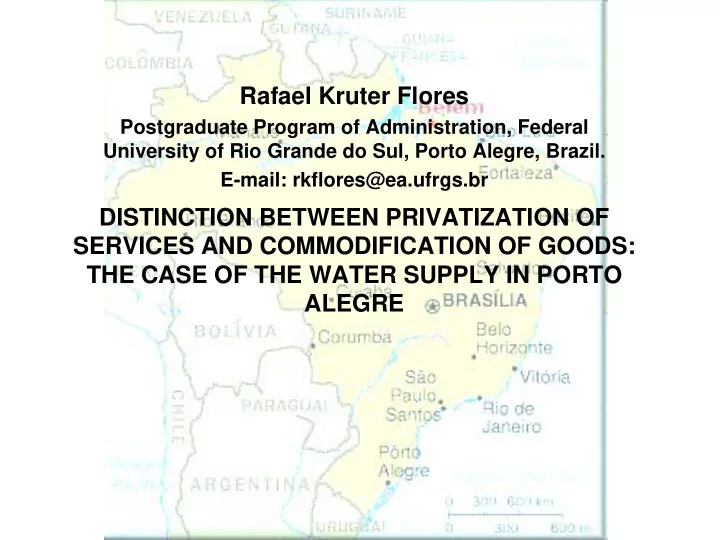

Rafael Kruter Flores Postgraduate Program of Administration, Federal University of Rio Grande do Sul, Porto Alegre, Brazil. E-mail: rkflores@ea.ufrgs.br DISTINCTION BETWEEN PRIVATIZATION OF SERVICES AND COMMODIFICATION OF GOODS: THE CASE OF THE WATER SUPPLY IN PORTO ALEGRE
Introduction • In the last two decades, many water provision were privatized, specially in the South. In this context, processes of social struggles emerged, and many have achieved to re- nationalize the services. • The ‘water war’, in Cochabamba, Bolivia, became a symbol of the discourse of water as a common , instead of an economic good (as stated in the Dublin Principles). • DMAE, in Porto Alegre, is another symbol against privatization: it is a public service with quality and social control (MALTZ, 2007; VIERO, 2004)
Introduction • Publications on this issue (water as a common good) have shown two shortcomings: 1. Superficial analysis : focus on the failures of the private companies. Fails to consider deepest mechanism of the capitalist system that are on the origin of the privatizing process. 2. Utopic analysis : attempts to find solutions to equality in the distribution of water through discursive struggles, awareness and diplomacy, advocating the promotion of policies and social contracts between governs and companies: proved to be utopist.
Introduction • My PhD project: to develop a theoretical approach capable of articulating different appearences of water phenomenons, considering the ways by which they are part of capital accumulation processes; to indicate theoretical contributions to the development of the concept of water as a common good. While commodification, in one hand, referes to turning water from a public good into a marketable commodity subject to principles governing a market economy (regardless of nature of the ownership of both water and the water companies), privatization referes to changing ownership of water infrastructure and/or to the private management of water services. (SWYNGEDOUW et al., 2003, p. 129). • This paper developes this specific argument, reflecting on the case of the city of Porto Alegre.
Argument • The structuring of the water supply in Porto Alegre, considering the loans of institutions from the North, shows that there is a process of commodification of water even if the institution remains as a public property.
Material and methods • Epistemological paradigm: dialectical materialism (Marxism). To understand ‘the world contradictory structures and relationships’ (LEFEBVRE, 2009). • Qualitative case study. • Secondary data: scientific publications, articles in newspapers and magazines, institutional documents and information available on the Internet. • Primary data: official documents dating back to the historical moment of the creation of the DMAE, as the minutes and drafts of laws.
Results and discussions • The structuring of the water supply in Porto Alegre had three key moments: First moment, 1928: construction of the Moinhos de Vento Plant. The necessary amount was loaned by the U.S. Londeburg Thelmann & Co.: hydrometers were used for the first time and the users would be charged for excess of water consumed.
Results and discussions Second moment, 1961: creation of an autarchy (DMAE) and loan by Interamerican Development Bank (IDB) in order to improve and expand the services. The conditionalities were: • to take the necessary measures to produce enough revenue to cover at least the costs of operating and maintaining these systems; • to establish an adequate system of administration and accounting; • to install hydrometers so that by 1967, 80% of water was to be measured; • to hire a high-level consultancy for the preparation of a reorganization plan in Porto Alegre, to be approved by the IDB.
Results and discussions Third moment, 2002: increasing in the sewage capacity, funded by the Brazilian Government and the IDB. Tariff and accountability systems were redesigned. • Water supply and sewage have, besides a utility function required by a booming city, an exchange function, by which water would be transformed into a mean of payment of loans. Besides the use-value, water and sewage have an exchange-value.
Results and discussions • The use-values are the qualitative aspects of something, that make it useful for some purpose. "Use values become a reality only by use or consumption: they also constitute the substance of all wealth, whatever may be the social form of that wealth" (MARX, 1999). • Exchange value , at first sight, presents itself as a quantitative relation, as the proportion in which values in use of one sort are exchanged for those of another sort, a relation constantly changing with time and place (MARX, 1993).
Conclusion/contradiction • The main contradiction to be overcome lies in the different ways in which water can be appropriated. • Porto Alegre’s water and sewage services are a model of public services, and a symbol in the struggle against the privatization of water supply. • At the same time, the very establishment of this public service was made through a process of commodification of water, which is a different way by which water can be appropriated.
Recommend
More recommend